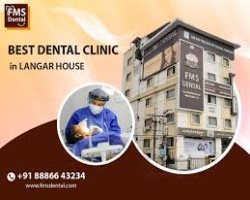
ave you ever looked in the mirror and wondered whether your teeth are aligned correctly? Or maybe you've experienced jaw discomfort or difficulty chewing but never connected the dots? Braces aren’t just for teenagers anymore—people of all ages now seek orthodontic treatment for both cosmetic and functional reasons. But how do you know if you really need braces?
If you’re unsure whether it’s time to schedule a visit to the orthodontist, this guide will help you identify the tell-tale signs. And if you're considering starting your smile journey, you'll be glad to know that you have access to quality and affordable Dental Braces in Islamabad to help you achieve optimal oral health and confidence.
Why Braces Matter Beyond Appearance
Braces do more than create a straight, Instagram-worthy smile. They correct underlying structural issues that can impact your dental health, jaw function, and even your ability to speak or eat properly.
When teeth are misaligned, they are harder to clean, more prone to decay, and can cause unnecessary pressure on your jaw joints. Orthodontic treatment addresses these issues by guiding your teeth into their proper positions and balancing your bite.
1. You Have Crooked or Crowded Teeth
This is perhaps the most obvious sign. If your teeth overlap, twist, or appear uneven, it may indicate insufficient space in your jaw. Crowding not only affects appearance but also makes brushing and flossing difficult, increasing the risk of cavities and gum disease.
Braces create room for your teeth to sit properly, improving both function and aesthetics.
2. You Have Gaps Between Teeth
Large gaps or spacing between teeth can result from missing teeth, small teeth, or abnormal jaw development. These spaces can trap food, promote plaque buildup, and lead to gum issues.
Orthodontists use braces or aligners to close these gaps, improving bite function and overall hygiene.
3. Your Bite Feels “Off” or Uncomfortable
Do your upper and lower teeth not come together correctly when you close your mouth? Bite issues are one of the most common reasons people are referred to orthodontists.
There are several types of bite misalignments:
Overbite: Upper front teeth excessively overlap the lower teeth
Underbite: Lower teeth extend beyond the upper teeth
Crossbite: Some upper teeth sit inside lower teeth
Open bite: Teeth don’t touch at all when the mouth is closed
If your bite feels uneven or causes discomfort, you may need orthodontic treatment.
4. Jaw Pain or Clicking Sounds
Misaligned teeth often cause the jaw to shift out of its natural position, placing stress on the temporomandibular joint (TMJ). This can lead to:
Jaw pain or tenderness
Clicking or popping sounds when opening or closing the mouth
Headaches or neck pain
Difficulty chewing
Braces can correct jaw alignment and reduce pressure on the TMJ, providing long-term relief.
5. You Have Difficulty Chewing or Biting
Do you find it challenging to chew food evenly or bite into certain foods without discomfort? This could be a result of misaligned teeth or bite problems.
In severe cases, poor alignment can even lead to uneven tooth wear, causing long-term damage. An orthodontist can help correct these issues with braces or aligners.
6. Speech Issues
You might be surprised to learn that misaligned teeth can affect your speech. Certain sounds—like "s", "sh", and "th"—require precise placement of the tongue against the teeth. When teeth are out of alignment, pronunciation can suffer.
Orthodontic treatment often improves speech clarity, especially in children.
7. Mouth Breathing or Snoring
Chronic mouth breathing or snoring may indicate underlying jaw or dental issues, especially in children. Misaligned jaws can restrict the airway and affect breathing patterns.
Orthodontic treatment, sometimes in collaboration with other specialists, can correct jaw alignment and improve airway function.
8. You’re Self-Conscious About Your Smile
Let’s be honest—confidence matters. If you avoid smiling in photos, covering your mouth when you laugh, or holding back in conversations because of your teeth, it's time to take action.
Braces can be a life-changing solution. Modern orthodontic options like ceramic braces or clear aligners make the process discreet and comfortable.
9. Your Child is 7 Years or Older
According to the American Association of Orthodontists, children should have their first orthodontic checkup by age seven. At this age, orthodontists can detect developing issues like crowding, bite problems, or jaw growth imbalances early.
Starting treatment early may prevent more complex problems later on.
10. You Wore Braces Before… But Your Teeth Shifted Back
Relapse after braces is common—especially if you didn’t wear your retainers as recommended. Even if your teeth were straight once, they can shift back over time due to aging, grinding, or natural movement.
A quick orthodontic assessment can determine whether a minor touch-up or full treatment is necessary.
What to Expect During an Orthodontic Consultation
If you’ve experienced any of the signs above, the next step is a consultation with a certified orthodontist. During your visit, you can expect:
A full oral examination
X-rays or 3D scans of your teeth and jaw
A discussion of your concerns and goals
A customized treatment plan with options and estimated timelines
A breakdown of costs, including available payment plans
Don’t worry—it’s a pain-free and informative process designed to help you make an empowered decision.
Options for Braces in Islamabad
The good news? You have access to a variety of modern, effective, and affordable braces in the capital city. These include:
Traditional Metal Braces – Strong and affordable
Ceramic Braces – Less visible and ideal for teens or adults
Lingual Braces – Hidden behind the teeth for complete discretion
Clear Aligners – Removable, transparent trays like Invisalign
Your orthodontist will help you choose the right type of braces based on your dental condition, lifestyle, and budget.
Conclusion: Don’t Wait—Your Healthier Smile Starts with a Consultation
Recognizing the signs that you may need braces is the first step toward a healthier, more confident you. From correcting bite problems and easing jaw pain to improving your oral hygiene and self-esteem, braces offer more than just a pretty smile—they protect your long-term dental health.
You may also like
More from this category.

The Power of Tandoor Ovens in Modern Commercial Kitchens

Tooth Extraction in West Delhi – Expert Oral Surgery Care | DentoHub

Vinny Pizza: A Slice of Authentic Flavor with a Modern Twist

County Pizza: Where Local Flavor Meets Legendary Taste

NextGen Diagnostic Imaging

Get the Perfect Smile with the Best Orthodontist in Langar House at FMS Dental

Best Dentist in Hyderabad – Patient-Focused Care at FMS Dental

Why Selenium Is the Most Popular Tool for Web Automation?

Anti-Aging Treatments: Modern Solutions for Youthful, Healthy-Looking Skin

